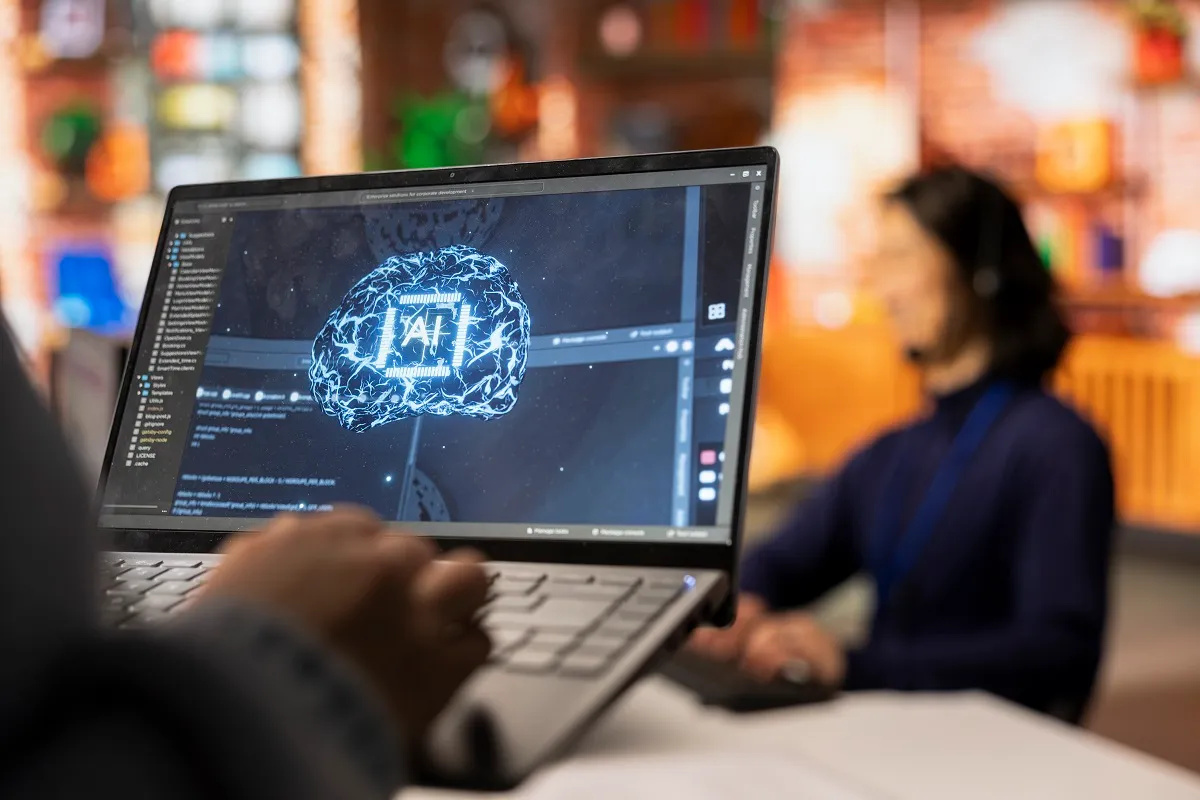The digital world is changing faster than ever, and businesses are constantly searching for ways to create smarter, faster, and more engaging websites. One of the most significant game-changers in recent years is AI in web design. Artificial Intelligence is no longer a futuristic concept; it’s now a practical tool that designers and developers use to enhance user experience, streamline processes, and build highly personalized websites.
For businesses aiming to stand out, understanding how AI is revolutionizing web design is essential. From automated layouts to intelligent content creation, AI-driven tools are transforming the way websites are built and maintained.
Why AI Is Becoming Essential in Modern Web Design
In the past, web design relied heavily on manual coding, creativity, and hours of testing to ensure a site performed well. Today, AI technology simplifies these tasks by automating repetitive processes and providing data-driven insights.
Designers now use AI to analyze user behavior, predict trends, and create layouts that are not only visually appealing but also highly functional. This means businesses can deliver a better user experience without spending endless hours on trial and error.
The biggest advantage of integrating AI into web design is the ability to make decisions based on real-time data. This ensures that websites are not just beautiful but also optimized for performance and conversions.
How AI Improves User Experience
A website’s success often depends on the experience it provides to visitors. With AI, businesses can create websites that feel intuitive and personalized. Here’s how AI takes user experience to the next level:
- Personalized Content: AI algorithms study user behavior and preferences, then display content tailored to individual visitors.
- Smart Navigation: AI can predict what users are likely to search for and present relevant suggestions.
- 24/7 Chat Support: AI-powered chatbots provide instant responses, enhancing customer engagement.
For companies focusing on website design Knoxville, integrating AI-driven personalization can be a game-changer, making websites more interactive and customer-friendly.
AI-Powered Design Tools Making a Difference
Several AI-based tools have entered the market, transforming how designers work. Tools like Wix ADI and Bookmark use AI to generate website layouts within minutes. These platforms ask a few questions about the business and then build a custom design tailored to its needs.
Other advanced tools, such as Adobe Sensei, help with automated image editing, color adjustments, and layout suggestions. These innovations allow designers to focus on creativity while AI handles repetitive tasks.
By leveraging these tools, businesses not only save time but also ensure that their websites stay modern and aligned with current trends.
Automation and Speed: Why It Matters
One of the biggest benefits of AI in web design is automation. From coding assistance to real-time optimization, AI speeds up the entire design process. This allows companies to launch websites faster and update them efficiently.
AI can automatically test different versions of a page (A/B testing) and identify which one performs best. It can also optimize images for faster load times without compromising quality. All of these factors contribute to a better user experience and higher conversion rates.
For growing businesses, especially those looking for website design Knoxville services, the ability to launch an optimized website quickly can provide a strong competitive edge.
AI and Responsive Design
In today’s world, people access websites from multiple devices—desktops, tablets, and smartphones. Responsive design ensures that a website looks and works well on all screen sizes. AI simplifies this process by automatically adjusting layouts and testing responsiveness across different devices.
Rather than manually coding for each device type, designers can rely on AI to handle the adjustments. This ensures users have a smooth experience no matter how they access the site.
AI even predicts the most common screen resolutions and optimizes images and elements accordingly, reducing errors and improving overall performance.
How AI Enhances SEO and Content Strategy
AI doesn’t just improve design; it also plays a major role in SEO and content marketing. Search engines like Google prioritize websites that deliver value, load quickly, and provide a seamless experience. AI tools can analyze keyword trends, suggest content topics, and even optimize on-page elements automatically.
Content generation tools powered by AI can assist in creating blogs, product descriptions, and headlines that attract both users and search engines. By doing so, businesses can rank higher and reach a larger audience.
For companies investing in website design Knoxville, implementing AI-driven SEO strategies ensures better visibility and stronger online presence.
AI and Accessibility: Making Websites Inclusive
Accessibility is no longer optional—it’s a necessity. AI can help make websites more inclusive by automatically adding alt text to images, generating voice commands, and adjusting contrast for visually impaired users.
Tools powered by AI can scan a website for accessibility issues and suggest improvements. This not only enhances user experience but also ensures compliance with accessibility standards like WCAG.
Businesses that embrace accessibility demonstrate a commitment to all users, which builds trust and credibility in the digital space.
AI-Powered Analytics for Smarter Decisions
Data is at the heart of any successful online strategy. AI provides advanced analytics that go beyond basic metrics like page views and bounce rates. It can analyze user behavior in detail, predict future trends, and suggest changes that can improve engagement and conversions.
For example, if a business notices that users are leaving a page quickly, AI can recommend layout changes, new content, or different call-to-action placements. This helps businesses stay ahead in a competitive market and continuously optimize for better results.
The Future of Web Design with AI
The future of web design is intelligent, automated, and highly personalized. AI will continue to play a central role by integrating with technologies like AR (Augmented Reality), VR (Virtual Reality), and voice interfaces.
Imagine websites that can predict user needs before they even click or designs that adapt in real-time based on mood and preferences. These are no longer distant possibilities—they are becoming realities as AI evolves.
Businesses that adopt AI early in their web design strategy will stay ahead of the curve and deliver exceptional digital experiences.
Why Businesses Should Embrace AI Now
Adopting AI in web design isn’t just about staying trendy—it’s about delivering value to customers and achieving business goals efficiently. From cost savings to enhanced user experience, the benefits are undeniable.
Companies that leverage AI tools for web design can launch sites faster, maintain them easily, and optimize them for performance and conversions. In a world where online presence defines success, embracing AI is not an option—it’s a necessity.
Final Thoughts
Artificial Intelligence is no longer a futuristic idea—it’s here, and it’s transforming web design as we know it. Businesses looking to stand out in competitive markets, like those investing in website design Knoxville, can leverage AI to create smarter, more efficient, and highly engaging websites.
The future belongs to businesses that combine creativity with technology. AI provides the tools to make that happen. By embracing these innovations now, companies can ensure they deliver top-notch user experiences and maintain a strong digital presence for years to come.
FAQ
How is AI used in web design?
AI is used in web design to automate tasks like layout creation, content personalization, image optimization, and user behavior analysis. It helps designers build responsive, user-friendly websites faster and with better performance.
Can AI design a website from scratch?
Yes, AI-powered tools can design a website from scratch by asking a few questions about your business and automatically generating layouts, colors, and content suggestions. Platforms like Wix ADI and Bookmark are popular examples.
What are the benefits of AI in web design?
AI in web design improves efficiency, speeds up development, personalizes user experiences, and enhances SEO. It also reduces manual work for designers by automating repetitive tasks like coding and testing.
Does AI make websites more user-friendly?
Yes, AI makes websites more user-friendly by analyzing visitor behavior and providing personalized content, smart navigation, and chatbot support. This creates a smoother, more engaging experience for users.
How does AI help with website responsiveness?
AI ensures responsive design by automatically adjusting layouts, fonts, and images for different devices. It also tests website performance across multiple screen sizes to maintain a consistent experience.
Is AI important for SEO in web design?
Absolutely. AI helps with keyword research, content optimization, and analyzing user intent. It also suggests improvements that boost rankings, making SEO an integral part of AI-driven web design.
Can AI replace web designers completely?
No, AI cannot fully replace web designers. While it automates many tasks, creativity, branding decisions, and complex customization still require human expertise. AI is a tool to assist, not replace.
What is an AI website builder?
An AI website builder is a platform that uses artificial intelligence to create websites automatically. It gathers input from users, then builds layouts, color schemes, and features without manual coding
How does AI improve website speed?
AI improves website speed by compressing images, optimizing code, and detecting performance issues in real-time. Faster websites provide better user experiences and higher search engine rankings.
Is AI in web design suitable for small businesses?
Yes, AI-powered web design tools are ideal for small businesses because they reduce costs, speed up development, and provide professional-looking websites without needing advanced technical skills.





